Quantum Computers: Exploring Components, Processing, and Trends
VerifiedAdded on 2023/04/21
|9
|2249
|119
Report
AI Summary
This report provides an overview of quantum computers, highlighting their importance, key components, and future trends. It discusses the fundamental concepts of quantum computing, including quantum mechanics, entanglement, and superposition. The report details the various units of a quantum computer, such as input/output, quantum memory, and processing units, with a particular focus on the subsections within processing units like unitary operators, conditional operators, register operators, quantum functions, pseudo-classic operators, and universal quantum gates. Furthermore, the report explores the potential integration of quantum computing with other advanced IT technologies, addressing current limitations and future prospects, such as controlling quantum particles, managing heat loss, and reducing component costs. The paper concludes by emphasizing the potential of quantum computers to revolutionize various fields through advancements in quantum mechanics.
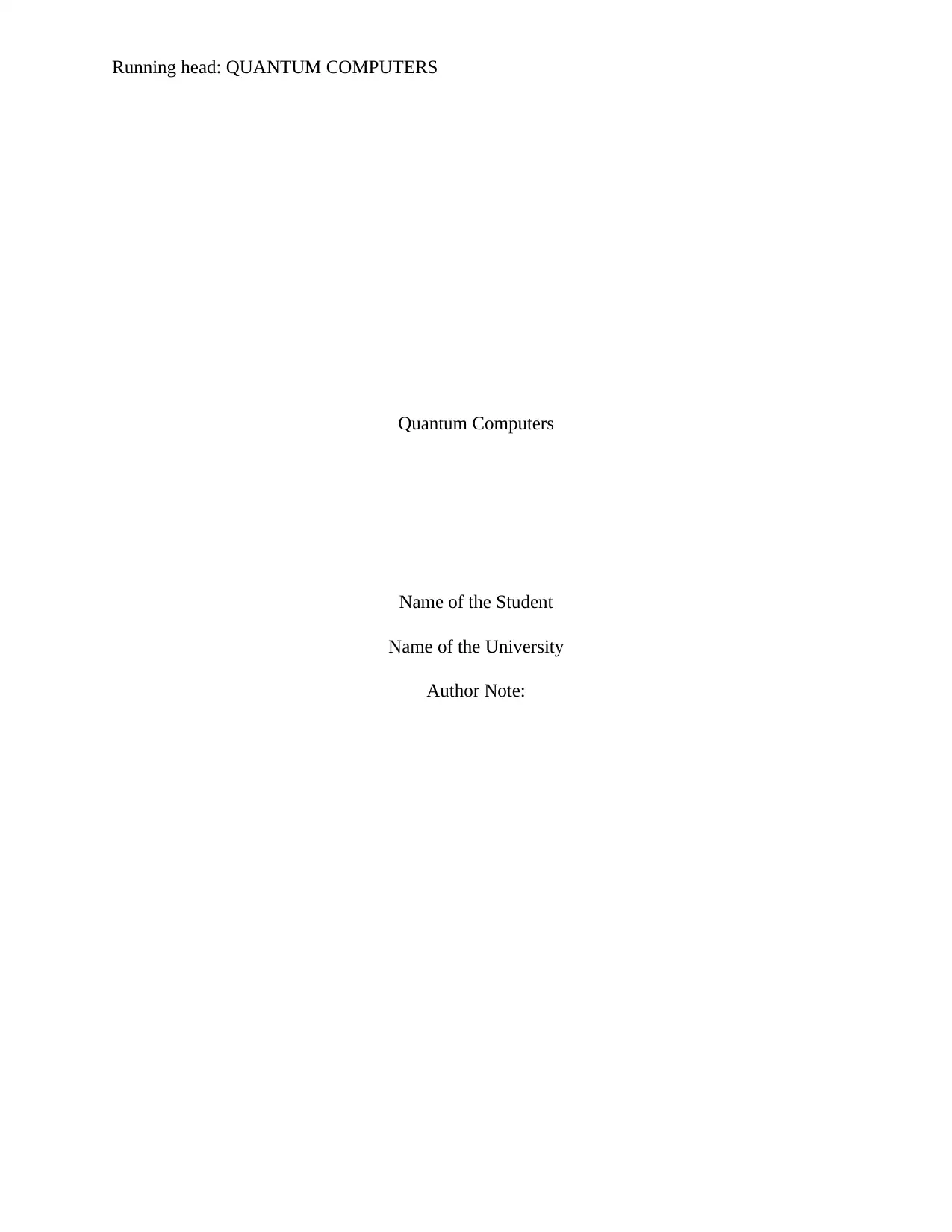
Running head: QUANTUM COMPUTERS
Quantum Computers
Name of the Student
Name of the University
Author Note:
Quantum Computers
Name of the Student
Name of the University
Author Note:
Paraphrase This Document
Need a fresh take? Get an instant paraphrase of this document with our AI Paraphraser
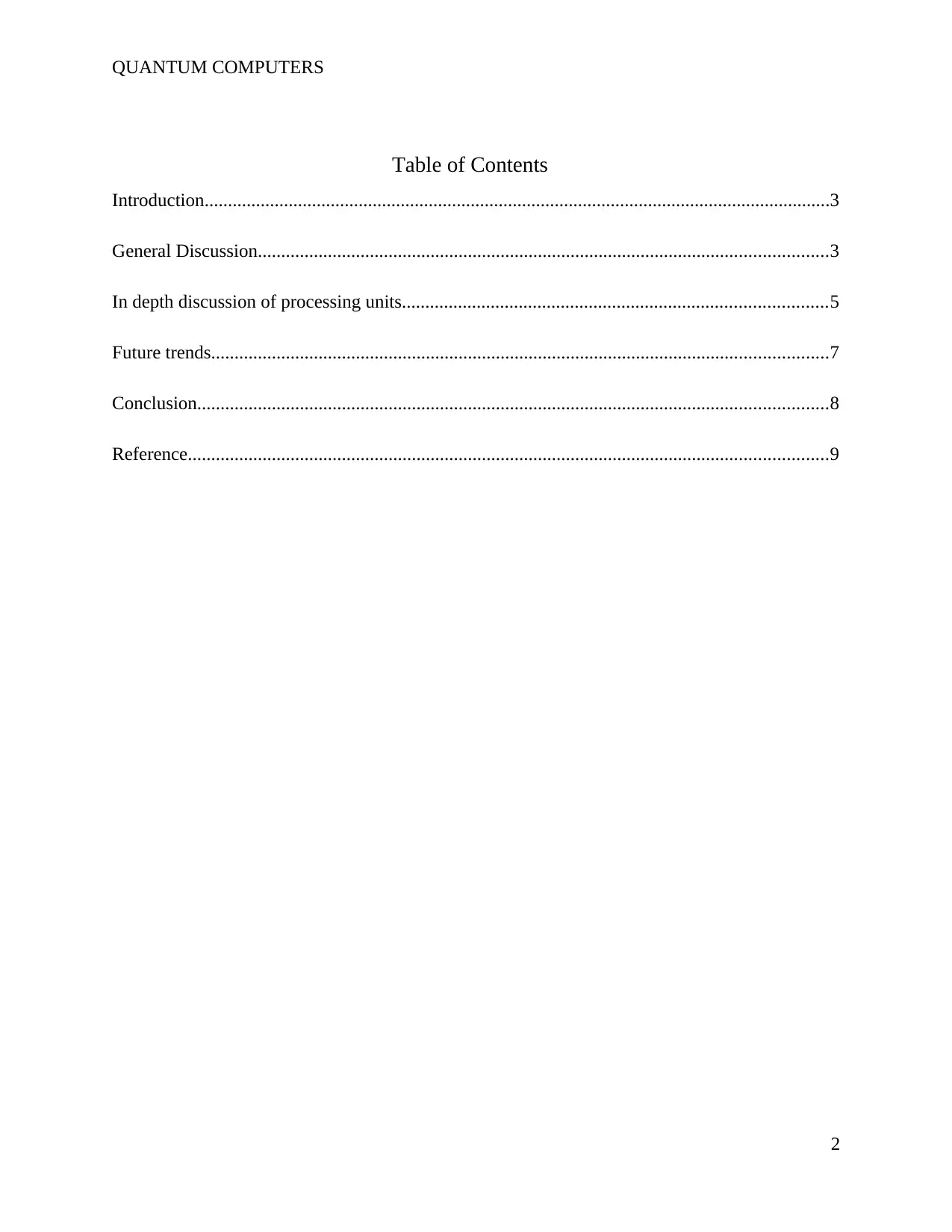
QUANTUM COMPUTERS
Table of Contents
Introduction......................................................................................................................................3
General Discussion..........................................................................................................................3
In depth discussion of processing units...........................................................................................5
Future trends....................................................................................................................................7
Conclusion.......................................................................................................................................8
Reference.........................................................................................................................................9
2
Table of Contents
Introduction......................................................................................................................................3
General Discussion..........................................................................................................................3
In depth discussion of processing units...........................................................................................5
Future trends....................................................................................................................................7
Conclusion.......................................................................................................................................8
Reference.........................................................................................................................................9
2
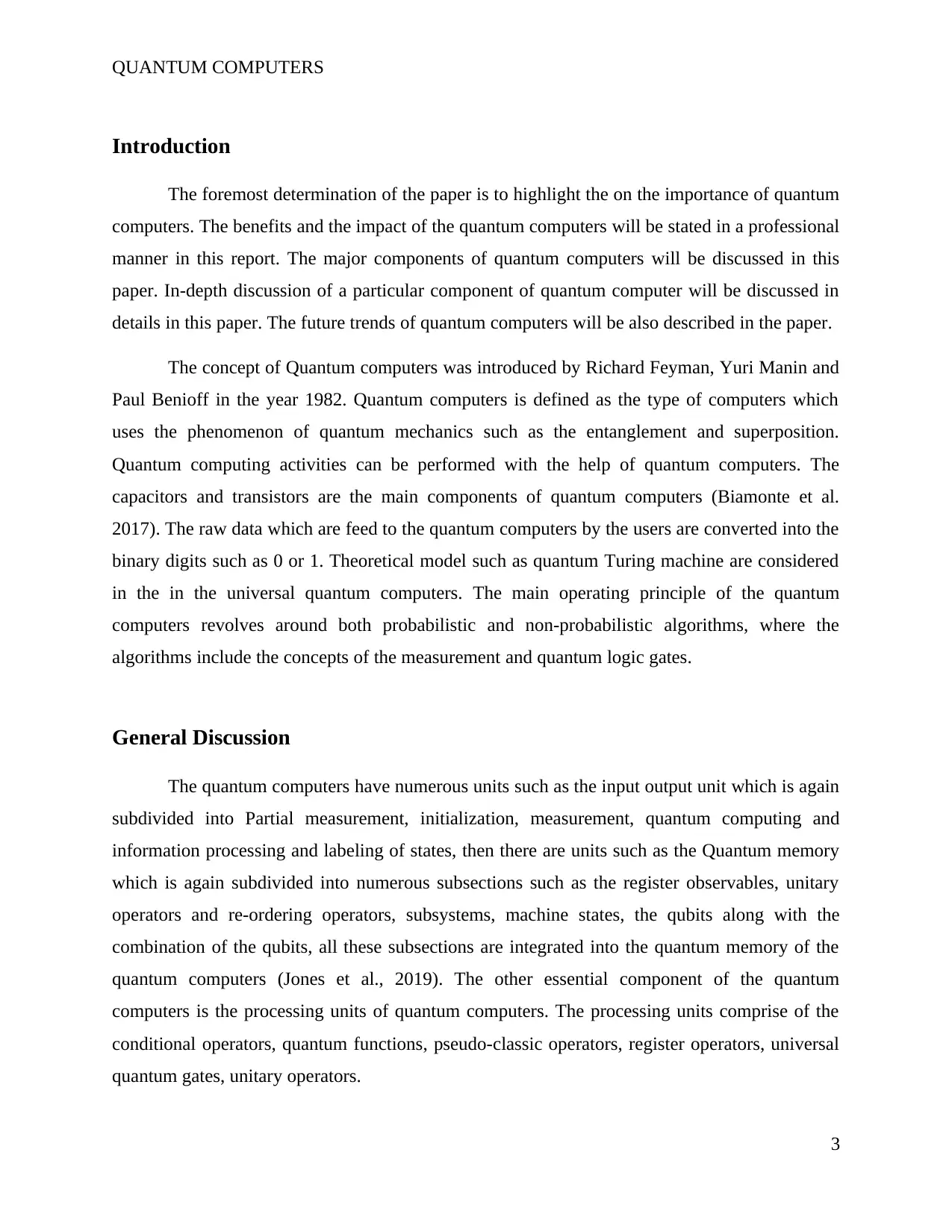
QUANTUM COMPUTERS
Introduction
The foremost determination of the paper is to highlight the on the importance of quantum
computers. The benefits and the impact of the quantum computers will be stated in a professional
manner in this report. The major components of quantum computers will be discussed in this
paper. In-depth discussion of a particular component of quantum computer will be discussed in
details in this paper. The future trends of quantum computers will be also described in the paper.
The concept of Quantum computers was introduced by Richard Feyman, Yuri Manin and
Paul Benioff in the year 1982. Quantum computers is defined as the type of computers which
uses the phenomenon of quantum mechanics such as the entanglement and superposition.
Quantum computing activities can be performed with the help of quantum computers. The
capacitors and transistors are the main components of quantum computers (Biamonte et al.
2017). The raw data which are feed to the quantum computers by the users are converted into the
binary digits such as 0 or 1. Theoretical model such as quantum Turing machine are considered
in the in the universal quantum computers. The main operating principle of the quantum
computers revolves around both probabilistic and non-probabilistic algorithms, where the
algorithms include the concepts of the measurement and quantum logic gates.
General Discussion
The quantum computers have numerous units such as the input output unit which is again
subdivided into Partial measurement, initialization, measurement, quantum computing and
information processing and labeling of states, then there are units such as the Quantum memory
which is again subdivided into numerous subsections such as the register observables, unitary
operators and re-ordering operators, subsystems, machine states, the qubits along with the
combination of the qubits, all these subsections are integrated into the quantum memory of the
quantum computers (Jones et al., 2019). The other essential component of the quantum
computers is the processing units of quantum computers. The processing units comprise of the
conditional operators, quantum functions, pseudo-classic operators, register operators, universal
quantum gates, unitary operators.
3
Introduction
The foremost determination of the paper is to highlight the on the importance of quantum
computers. The benefits and the impact of the quantum computers will be stated in a professional
manner in this report. The major components of quantum computers will be discussed in this
paper. In-depth discussion of a particular component of quantum computer will be discussed in
details in this paper. The future trends of quantum computers will be also described in the paper.
The concept of Quantum computers was introduced by Richard Feyman, Yuri Manin and
Paul Benioff in the year 1982. Quantum computers is defined as the type of computers which
uses the phenomenon of quantum mechanics such as the entanglement and superposition.
Quantum computing activities can be performed with the help of quantum computers. The
capacitors and transistors are the main components of quantum computers (Biamonte et al.
2017). The raw data which are feed to the quantum computers by the users are converted into the
binary digits such as 0 or 1. Theoretical model such as quantum Turing machine are considered
in the in the universal quantum computers. The main operating principle of the quantum
computers revolves around both probabilistic and non-probabilistic algorithms, where the
algorithms include the concepts of the measurement and quantum logic gates.
General Discussion
The quantum computers have numerous units such as the input output unit which is again
subdivided into Partial measurement, initialization, measurement, quantum computing and
information processing and labeling of states, then there are units such as the Quantum memory
which is again subdivided into numerous subsections such as the register observables, unitary
operators and re-ordering operators, subsystems, machine states, the qubits along with the
combination of the qubits, all these subsections are integrated into the quantum memory of the
quantum computers (Jones et al., 2019). The other essential component of the quantum
computers is the processing units of quantum computers. The processing units comprise of the
conditional operators, quantum functions, pseudo-classic operators, register operators, universal
quantum gates, unitary operators.
3
⊘ This is a preview!⊘
Do you want full access?
Subscribe today to unlock all pages.

Trusted by 1+ million students worldwide
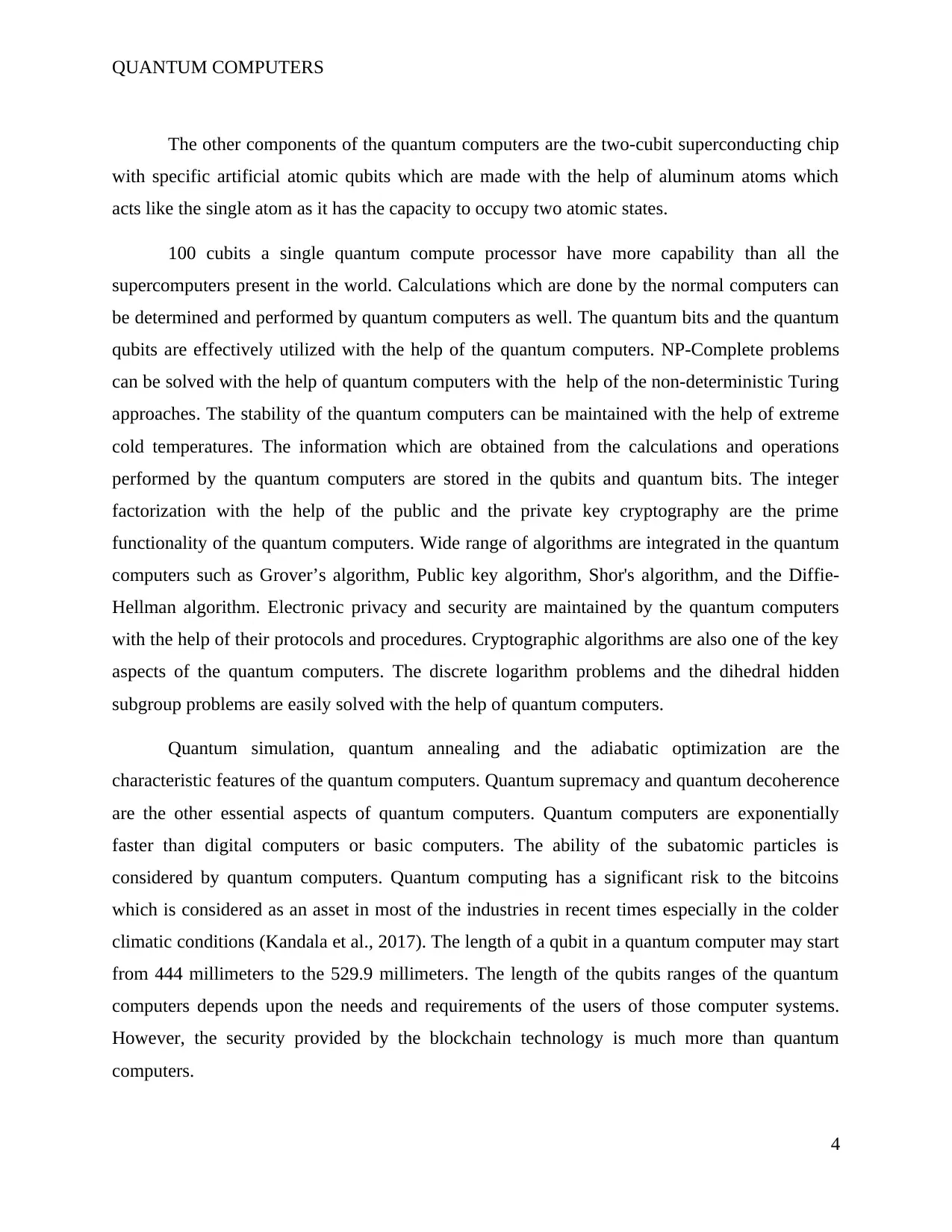
QUANTUM COMPUTERS
The other components of the quantum computers are the two-cubit superconducting chip
with specific artificial atomic qubits which are made with the help of aluminum atoms which
acts like the single atom as it has the capacity to occupy two atomic states.
100 cubits a single quantum compute processor have more capability than all the
supercomputers present in the world. Calculations which are done by the normal computers can
be determined and performed by quantum computers as well. The quantum bits and the quantum
qubits are effectively utilized with the help of the quantum computers. NP-Complete problems
can be solved with the help of quantum computers with the help of the non-deterministic Turing
approaches. The stability of the quantum computers can be maintained with the help of extreme
cold temperatures. The information which are obtained from the calculations and operations
performed by the quantum computers are stored in the qubits and quantum bits. The integer
factorization with the help of the public and the private key cryptography are the prime
functionality of the quantum computers. Wide range of algorithms are integrated in the quantum
computers such as Grover’s algorithm, Public key algorithm, Shor's algorithm, and the Diffie-
Hellman algorithm. Electronic privacy and security are maintained by the quantum computers
with the help of their protocols and procedures. Cryptographic algorithms are also one of the key
aspects of the quantum computers. The discrete logarithm problems and the dihedral hidden
subgroup problems are easily solved with the help of quantum computers.
Quantum simulation, quantum annealing and the adiabatic optimization are the
characteristic features of the quantum computers. Quantum supremacy and quantum decoherence
are the other essential aspects of quantum computers. Quantum computers are exponentially
faster than digital computers or basic computers. The ability of the subatomic particles is
considered by quantum computers. Quantum computing has a significant risk to the bitcoins
which is considered as an asset in most of the industries in recent times especially in the colder
climatic conditions (Kandala et al., 2017). The length of a qubit in a quantum computer may start
from 444 millimeters to the 529.9 millimeters. The length of the qubits ranges of the quantum
computers depends upon the needs and requirements of the users of those computer systems.
However, the security provided by the blockchain technology is much more than quantum
computers.
4
The other components of the quantum computers are the two-cubit superconducting chip
with specific artificial atomic qubits which are made with the help of aluminum atoms which
acts like the single atom as it has the capacity to occupy two atomic states.
100 cubits a single quantum compute processor have more capability than all the
supercomputers present in the world. Calculations which are done by the normal computers can
be determined and performed by quantum computers as well. The quantum bits and the quantum
qubits are effectively utilized with the help of the quantum computers. NP-Complete problems
can be solved with the help of quantum computers with the help of the non-deterministic Turing
approaches. The stability of the quantum computers can be maintained with the help of extreme
cold temperatures. The information which are obtained from the calculations and operations
performed by the quantum computers are stored in the qubits and quantum bits. The integer
factorization with the help of the public and the private key cryptography are the prime
functionality of the quantum computers. Wide range of algorithms are integrated in the quantum
computers such as Grover’s algorithm, Public key algorithm, Shor's algorithm, and the Diffie-
Hellman algorithm. Electronic privacy and security are maintained by the quantum computers
with the help of their protocols and procedures. Cryptographic algorithms are also one of the key
aspects of the quantum computers. The discrete logarithm problems and the dihedral hidden
subgroup problems are easily solved with the help of quantum computers.
Quantum simulation, quantum annealing and the adiabatic optimization are the
characteristic features of the quantum computers. Quantum supremacy and quantum decoherence
are the other essential aspects of quantum computers. Quantum computers are exponentially
faster than digital computers or basic computers. The ability of the subatomic particles is
considered by quantum computers. Quantum computing has a significant risk to the bitcoins
which is considered as an asset in most of the industries in recent times especially in the colder
climatic conditions (Kandala et al., 2017). The length of a qubit in a quantum computer may start
from 444 millimeters to the 529.9 millimeters. The length of the qubits ranges of the quantum
computers depends upon the needs and requirements of the users of those computer systems.
However, the security provided by the blockchain technology is much more than quantum
computers.
4
Paraphrase This Document
Need a fresh take? Get an instant paraphrase of this document with our AI Paraphraser
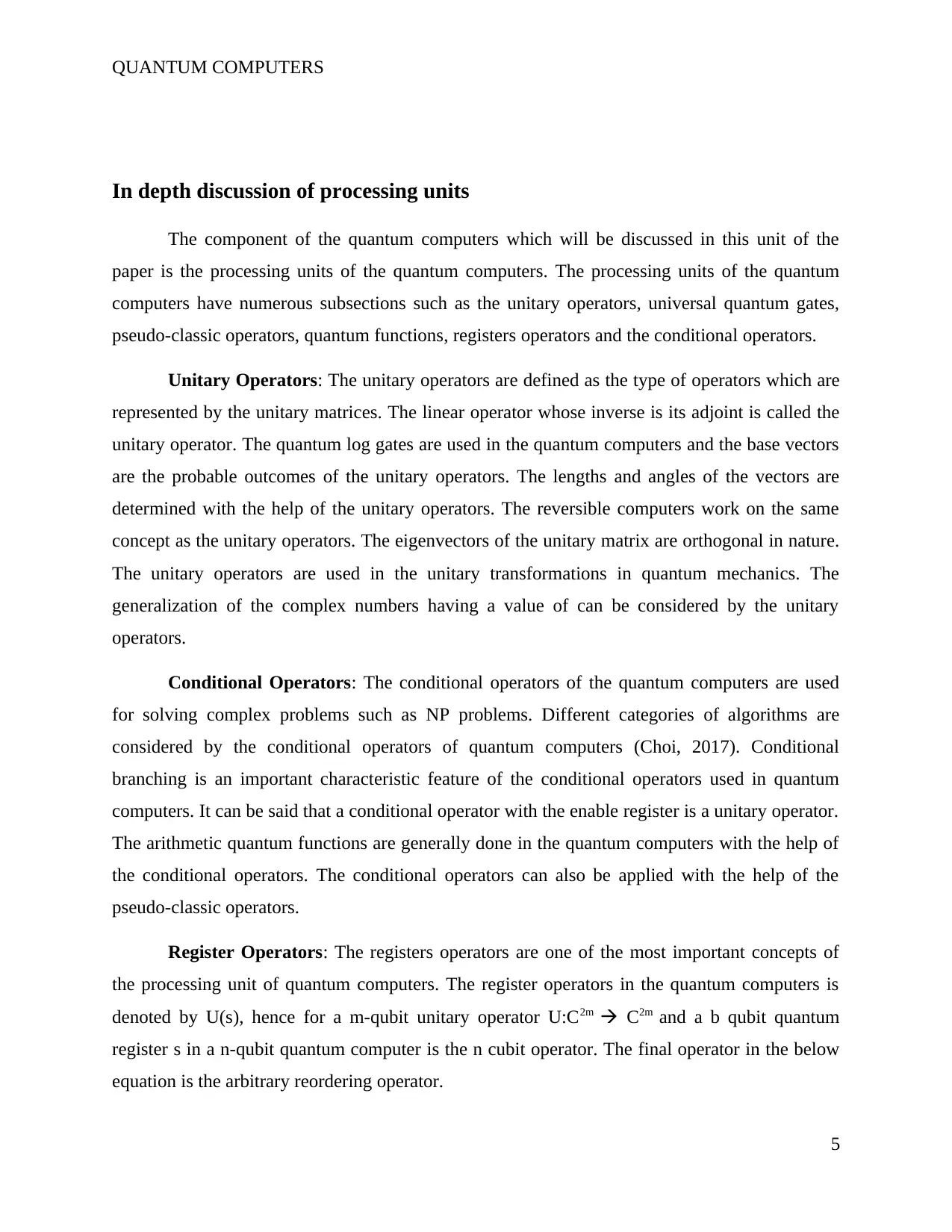
QUANTUM COMPUTERS
In depth discussion of processing units
The component of the quantum computers which will be discussed in this unit of the
paper is the processing units of the quantum computers. The processing units of the quantum
computers have numerous subsections such as the unitary operators, universal quantum gates,
pseudo-classic operators, quantum functions, registers operators and the conditional operators.
Unitary Operators: The unitary operators are defined as the type of operators which are
represented by the unitary matrices. The linear operator whose inverse is its adjoint is called the
unitary operator. The quantum log gates are used in the quantum computers and the base vectors
are the probable outcomes of the unitary operators. The lengths and angles of the vectors are
determined with the help of the unitary operators. The reversible computers work on the same
concept as the unitary operators. The eigenvectors of the unitary matrix are orthogonal in nature.
The unitary operators are used in the unitary transformations in quantum mechanics. The
generalization of the complex numbers having a value of can be considered by the unitary
operators.
Conditional Operators: The conditional operators of the quantum computers are used
for solving complex problems such as NP problems. Different categories of algorithms are
considered by the conditional operators of quantum computers (Choi, 2017). Conditional
branching is an important characteristic feature of the conditional operators used in quantum
computers. It can be said that a conditional operator with the enable register is a unitary operator.
The arithmetic quantum functions are generally done in the quantum computers with the help of
the conditional operators. The conditional operators can also be applied with the help of the
pseudo-classic operators.
Register Operators: The registers operators are one of the most important concepts of
the processing unit of quantum computers. The register operators in the quantum computers is
denoted by U(s), hence for a m-qubit unitary operator U:C2m C2m and a b qubit quantum
register s in a n-qubit quantum computer is the n cubit operator. The final operator in the below
equation is the arbitrary reordering operator.
5
In depth discussion of processing units
The component of the quantum computers which will be discussed in this unit of the
paper is the processing units of the quantum computers. The processing units of the quantum
computers have numerous subsections such as the unitary operators, universal quantum gates,
pseudo-classic operators, quantum functions, registers operators and the conditional operators.
Unitary Operators: The unitary operators are defined as the type of operators which are
represented by the unitary matrices. The linear operator whose inverse is its adjoint is called the
unitary operator. The quantum log gates are used in the quantum computers and the base vectors
are the probable outcomes of the unitary operators. The lengths and angles of the vectors are
determined with the help of the unitary operators. The reversible computers work on the same
concept as the unitary operators. The eigenvectors of the unitary matrix are orthogonal in nature.
The unitary operators are used in the unitary transformations in quantum mechanics. The
generalization of the complex numbers having a value of can be considered by the unitary
operators.
Conditional Operators: The conditional operators of the quantum computers are used
for solving complex problems such as NP problems. Different categories of algorithms are
considered by the conditional operators of quantum computers (Choi, 2017). Conditional
branching is an important characteristic feature of the conditional operators used in quantum
computers. It can be said that a conditional operator with the enable register is a unitary operator.
The arithmetic quantum functions are generally done in the quantum computers with the help of
the conditional operators. The conditional operators can also be applied with the help of the
pseudo-classic operators.
Register Operators: The registers operators are one of the most important concepts of
the processing unit of quantum computers. The register operators in the quantum computers is
denoted by U(s), hence for a m-qubit unitary operator U:C2m C2m and a b qubit quantum
register s in a n-qubit quantum computer is the n cubit operator. The final operator in the below
equation is the arbitrary reordering operator.
5
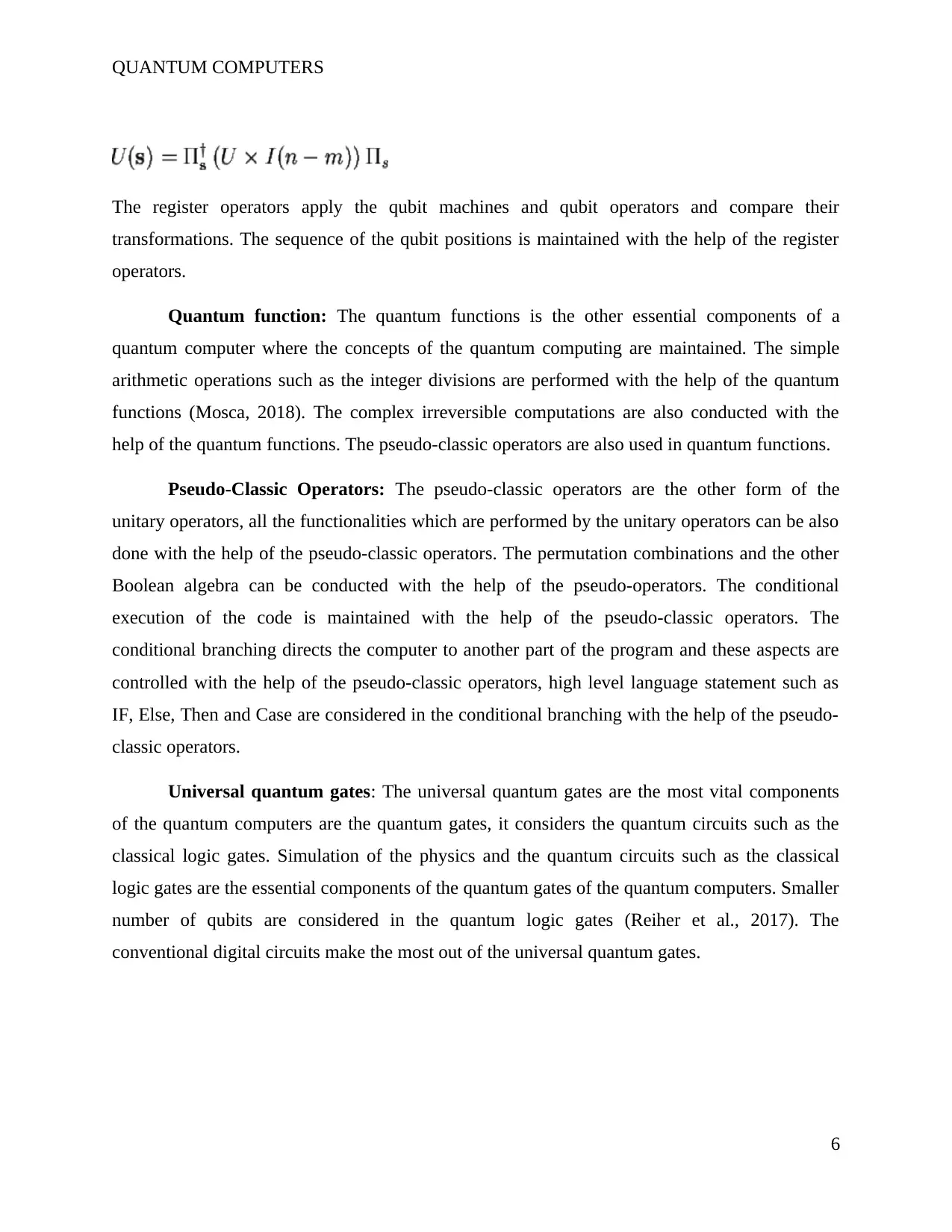
QUANTUM COMPUTERS
The register operators apply the qubit machines and qubit operators and compare their
transformations. The sequence of the qubit positions is maintained with the help of the register
operators.
Quantum function: The quantum functions is the other essential components of a
quantum computer where the concepts of the quantum computing are maintained. The simple
arithmetic operations such as the integer divisions are performed with the help of the quantum
functions (Mosca, 2018). The complex irreversible computations are also conducted with the
help of the quantum functions. The pseudo-classic operators are also used in quantum functions.
Pseudo-Classic Operators: The pseudo-classic operators are the other form of the
unitary operators, all the functionalities which are performed by the unitary operators can be also
done with the help of the pseudo-classic operators. The permutation combinations and the other
Boolean algebra can be conducted with the help of the pseudo-operators. The conditional
execution of the code is maintained with the help of the pseudo-classic operators. The
conditional branching directs the computer to another part of the program and these aspects are
controlled with the help of the pseudo-classic operators, high level language statement such as
IF, Else, Then and Case are considered in the conditional branching with the help of the pseudo-
classic operators.
Universal quantum gates: The universal quantum gates are the most vital components
of the quantum computers are the quantum gates, it considers the quantum circuits such as the
classical logic gates. Simulation of the physics and the quantum circuits such as the classical
logic gates are the essential components of the quantum gates of the quantum computers. Smaller
number of qubits are considered in the quantum logic gates (Reiher et al., 2017). The
conventional digital circuits make the most out of the universal quantum gates.
6
The register operators apply the qubit machines and qubit operators and compare their
transformations. The sequence of the qubit positions is maintained with the help of the register
operators.
Quantum function: The quantum functions is the other essential components of a
quantum computer where the concepts of the quantum computing are maintained. The simple
arithmetic operations such as the integer divisions are performed with the help of the quantum
functions (Mosca, 2018). The complex irreversible computations are also conducted with the
help of the quantum functions. The pseudo-classic operators are also used in quantum functions.
Pseudo-Classic Operators: The pseudo-classic operators are the other form of the
unitary operators, all the functionalities which are performed by the unitary operators can be also
done with the help of the pseudo-classic operators. The permutation combinations and the other
Boolean algebra can be conducted with the help of the pseudo-operators. The conditional
execution of the code is maintained with the help of the pseudo-classic operators. The
conditional branching directs the computer to another part of the program and these aspects are
controlled with the help of the pseudo-classic operators, high level language statement such as
IF, Else, Then and Case are considered in the conditional branching with the help of the pseudo-
classic operators.
Universal quantum gates: The universal quantum gates are the most vital components
of the quantum computers are the quantum gates, it considers the quantum circuits such as the
classical logic gates. Simulation of the physics and the quantum circuits such as the classical
logic gates are the essential components of the quantum gates of the quantum computers. Smaller
number of qubits are considered in the quantum logic gates (Reiher et al., 2017). The
conventional digital circuits make the most out of the universal quantum gates.
6
⊘ This is a preview!⊘
Do you want full access?
Subscribe today to unlock all pages.

Trusted by 1+ million students worldwide
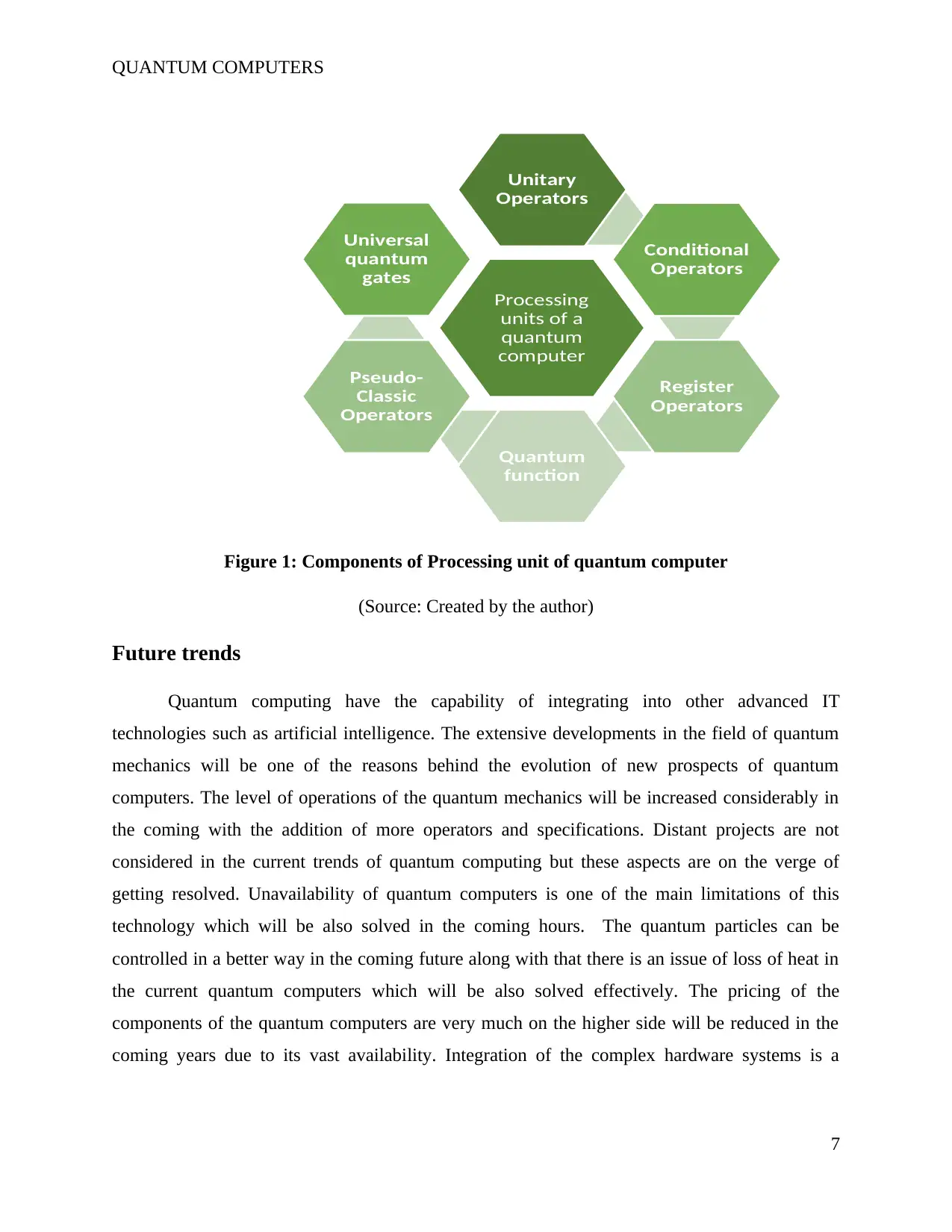
QUANTUM COMPUTERS
Figure 1: Components of Processing unit of quantum computer
(Source: Created by the author)
Future trends
Quantum computing have the capability of integrating into other advanced IT
technologies such as artificial intelligence. The extensive developments in the field of quantum
mechanics will be one of the reasons behind the evolution of new prospects of quantum
computers. The level of operations of the quantum mechanics will be increased considerably in
the coming with the addition of more operators and specifications. Distant projects are not
considered in the current trends of quantum computing but these aspects are on the verge of
getting resolved. Unavailability of quantum computers is one of the main limitations of this
technology which will be also solved in the coming hours. The quantum particles can be
controlled in a better way in the coming future along with that there is an issue of loss of heat in
the current quantum computers which will be also solved effectively. The pricing of the
components of the quantum computers are very much on the higher side will be reduced in the
coming years due to its vast availability. Integration of the complex hardware systems is a
7
Processing
units of a
quantum
computer
Unitary
Operators
Conditional
Operators
Register
Operators
Quantum
function
Pseudo-
Classic
Operators
Universal
quantum
gates
Figure 1: Components of Processing unit of quantum computer
(Source: Created by the author)
Future trends
Quantum computing have the capability of integrating into other advanced IT
technologies such as artificial intelligence. The extensive developments in the field of quantum
mechanics will be one of the reasons behind the evolution of new prospects of quantum
computers. The level of operations of the quantum mechanics will be increased considerably in
the coming with the addition of more operators and specifications. Distant projects are not
considered in the current trends of quantum computing but these aspects are on the verge of
getting resolved. Unavailability of quantum computers is one of the main limitations of this
technology which will be also solved in the coming hours. The quantum particles can be
controlled in a better way in the coming future along with that there is an issue of loss of heat in
the current quantum computers which will be also solved effectively. The pricing of the
components of the quantum computers are very much on the higher side will be reduced in the
coming years due to its vast availability. Integration of the complex hardware systems is a
7
Processing
units of a
quantum
computer
Unitary
Operators
Conditional
Operators
Register
Operators
Quantum
function
Pseudo-
Classic
Operators
Universal
quantum
gates
Paraphrase This Document
Need a fresh take? Get an instant paraphrase of this document with our AI Paraphraser
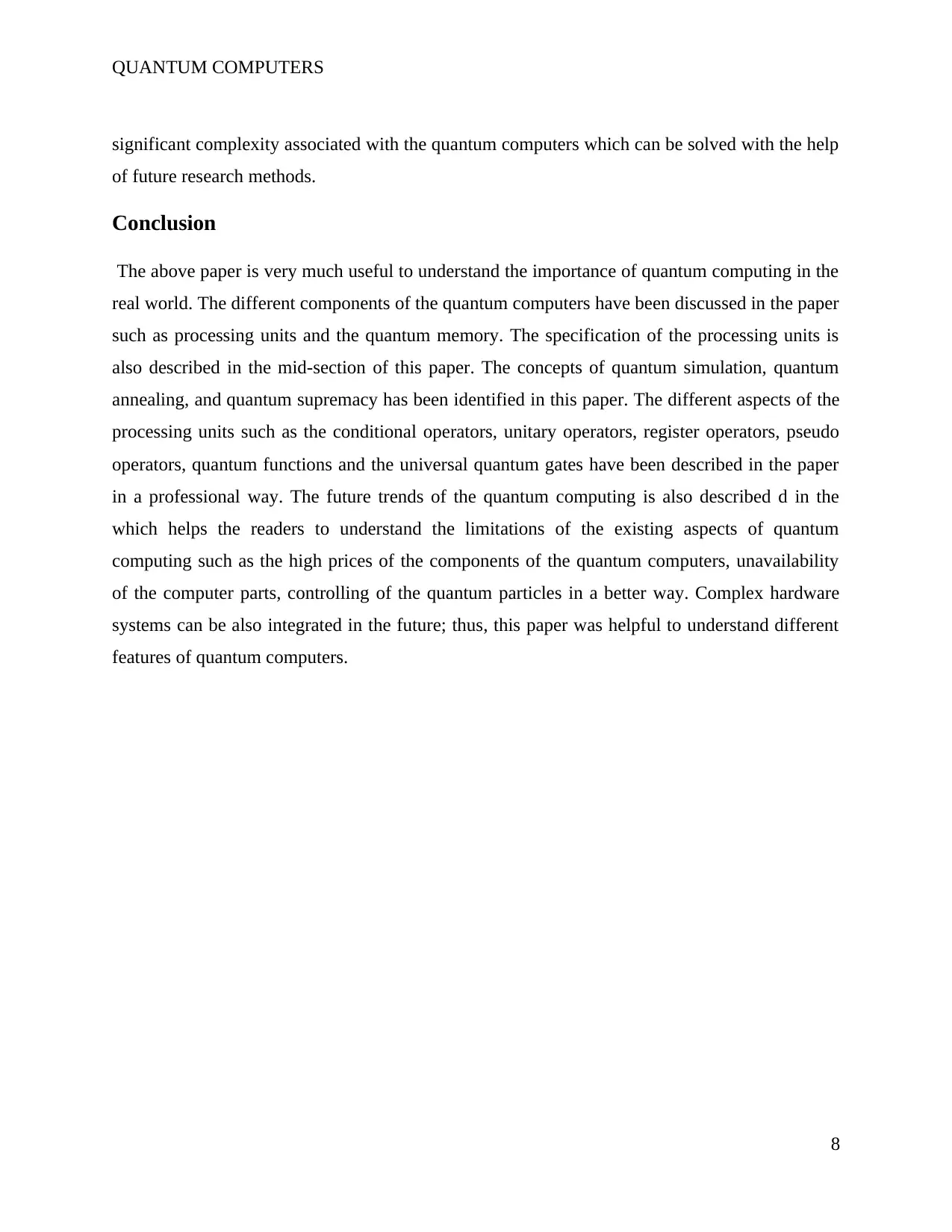
QUANTUM COMPUTERS
significant complexity associated with the quantum computers which can be solved with the help
of future research methods.
Conclusion
The above paper is very much useful to understand the importance of quantum computing in the
real world. The different components of the quantum computers have been discussed in the paper
such as processing units and the quantum memory. The specification of the processing units is
also described in the mid-section of this paper. The concepts of quantum simulation, quantum
annealing, and quantum supremacy has been identified in this paper. The different aspects of the
processing units such as the conditional operators, unitary operators, register operators, pseudo
operators, quantum functions and the universal quantum gates have been described in the paper
in a professional way. The future trends of the quantum computing is also described d in the
which helps the readers to understand the limitations of the existing aspects of quantum
computing such as the high prices of the components of the quantum computers, unavailability
of the computer parts, controlling of the quantum particles in a better way. Complex hardware
systems can be also integrated in the future; thus, this paper was helpful to understand different
features of quantum computers.
8
significant complexity associated with the quantum computers which can be solved with the help
of future research methods.
Conclusion
The above paper is very much useful to understand the importance of quantum computing in the
real world. The different components of the quantum computers have been discussed in the paper
such as processing units and the quantum memory. The specification of the processing units is
also described in the mid-section of this paper. The concepts of quantum simulation, quantum
annealing, and quantum supremacy has been identified in this paper. The different aspects of the
processing units such as the conditional operators, unitary operators, register operators, pseudo
operators, quantum functions and the universal quantum gates have been described in the paper
in a professional way. The future trends of the quantum computing is also described d in the
which helps the readers to understand the limitations of the existing aspects of quantum
computing such as the high prices of the components of the quantum computers, unavailability
of the computer parts, controlling of the quantum particles in a better way. Complex hardware
systems can be also integrated in the future; thus, this paper was helpful to understand different
features of quantum computers.
8
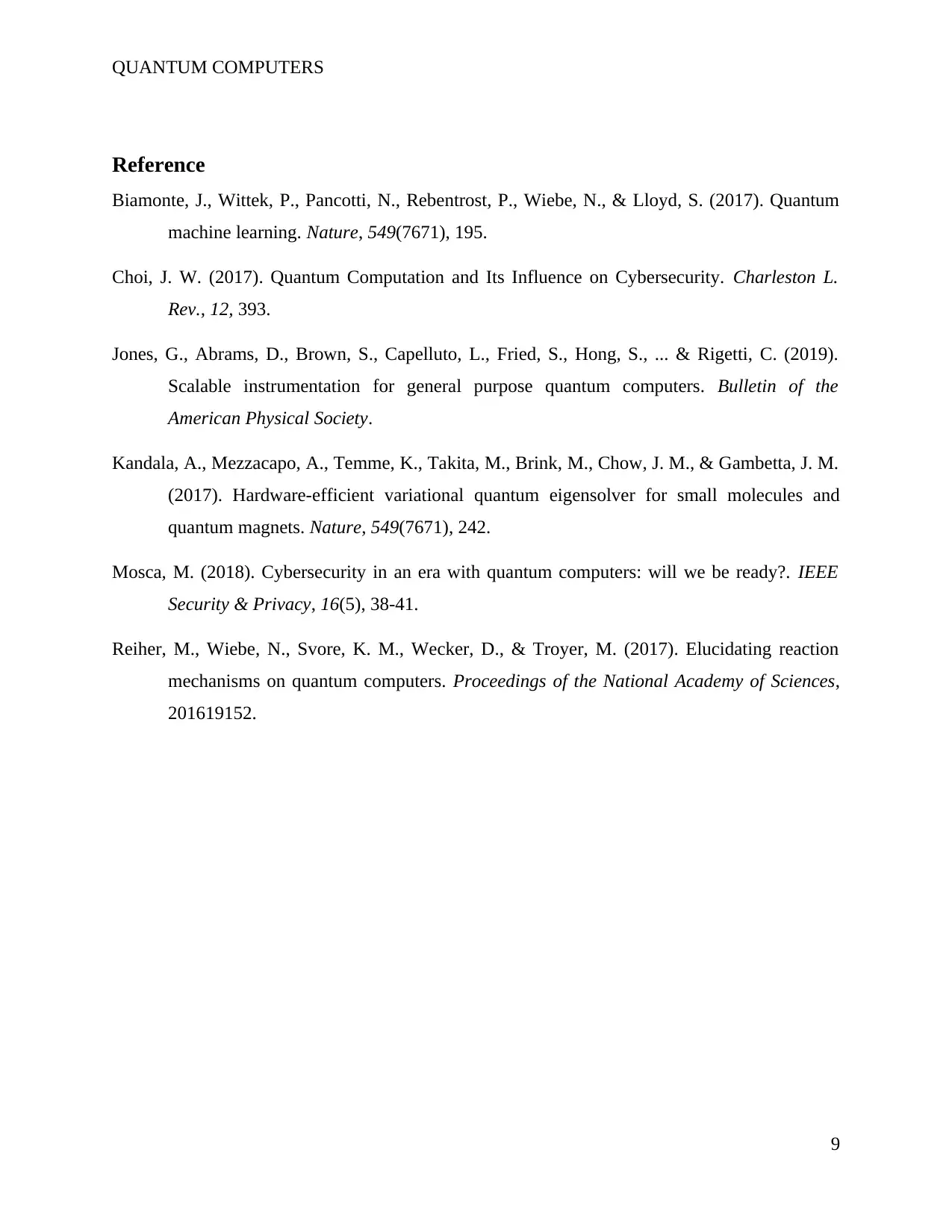
QUANTUM COMPUTERS
Reference
Biamonte, J., Wittek, P., Pancotti, N., Rebentrost, P., Wiebe, N., & Lloyd, S. (2017). Quantum
machine learning. Nature, 549(7671), 195.
Choi, J. W. (2017). Quantum Computation and Its Influence on Cybersecurity. Charleston L.
Rev., 12, 393.
Jones, G., Abrams, D., Brown, S., Capelluto, L., Fried, S., Hong, S., ... & Rigetti, C. (2019).
Scalable instrumentation for general purpose quantum computers. Bulletin of the
American Physical Society.
Kandala, A., Mezzacapo, A., Temme, K., Takita, M., Brink, M., Chow, J. M., & Gambetta, J. M.
(2017). Hardware-efficient variational quantum eigensolver for small molecules and
quantum magnets. Nature, 549(7671), 242.
Mosca, M. (2018). Cybersecurity in an era with quantum computers: will we be ready?. IEEE
Security & Privacy, 16(5), 38-41.
Reiher, M., Wiebe, N., Svore, K. M., Wecker, D., & Troyer, M. (2017). Elucidating reaction
mechanisms on quantum computers. Proceedings of the National Academy of Sciences,
201619152.
9
Reference
Biamonte, J., Wittek, P., Pancotti, N., Rebentrost, P., Wiebe, N., & Lloyd, S. (2017). Quantum
machine learning. Nature, 549(7671), 195.
Choi, J. W. (2017). Quantum Computation and Its Influence on Cybersecurity. Charleston L.
Rev., 12, 393.
Jones, G., Abrams, D., Brown, S., Capelluto, L., Fried, S., Hong, S., ... & Rigetti, C. (2019).
Scalable instrumentation for general purpose quantum computers. Bulletin of the
American Physical Society.
Kandala, A., Mezzacapo, A., Temme, K., Takita, M., Brink, M., Chow, J. M., & Gambetta, J. M.
(2017). Hardware-efficient variational quantum eigensolver for small molecules and
quantum magnets. Nature, 549(7671), 242.
Mosca, M. (2018). Cybersecurity in an era with quantum computers: will we be ready?. IEEE
Security & Privacy, 16(5), 38-41.
Reiher, M., Wiebe, N., Svore, K. M., Wecker, D., & Troyer, M. (2017). Elucidating reaction
mechanisms on quantum computers. Proceedings of the National Academy of Sciences,
201619152.
9
⊘ This is a preview!⊘
Do you want full access?
Subscribe today to unlock all pages.

Trusted by 1+ million students worldwide
1 out of 9
Your All-in-One AI-Powered Toolkit for Academic Success.
+13062052269
info@desklib.com
Available 24*7 on WhatsApp / Email
![[object Object]](/_next/static/media/star-bottom.7253800d.svg)
Unlock your academic potential
Copyright © 2020–2026 A2Z Services. All Rights Reserved. Developed and managed by ZUCOL.
